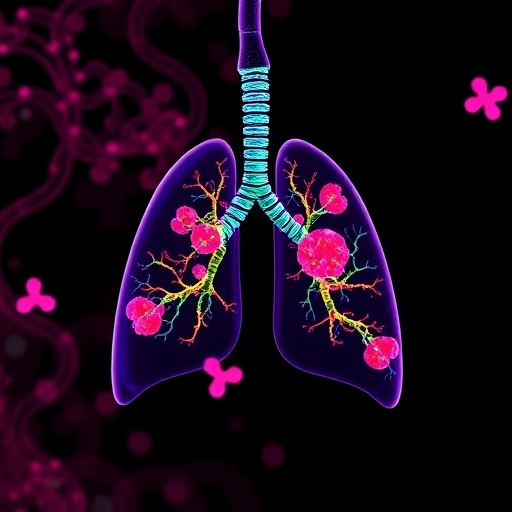In a groundbreaking advancement poised to reshape the landscape of cancer treatment, researchers at ChristianaCare’s Gene Editing Institute have unveiled a novel approach to combat chemotherapy resistance in lung cancer through precise gene editing techniques. Central to this pioneering study is the targeting of the NRF2 gene, a critical regulator implicated in the cancer cells’ ability to evade the toxic effects of chemotherapy. By harnessing the precision of CRISPR/Cas9 technology, the team achieved the selective disruption of NRF2, effectively reinstating chemotherapy sensitivity and impeding tumor progression.
This study emerges from over a decade of dedicated research focused on deciphering the multifaceted role of the NRF2 gene in cancer biology. Known for its function as a master transcription factor governing cellular defense against oxidative stress, NRF2’s aberrant activation within tumor cells has been conclusively linked to enhanced drug resistance. The research, published in the prestigious journal Molecular Therapy Oncology, elucidates the therapeutic potential of gene editing to overturn this resistance mechanism, a challenge that has long hindered effective cancer treatment.
Focusing specifically on lung squamous cell carcinoma—a notably aggressive subtype of non-small cell lung cancer (NSCLC) responsible for a significant fraction of lung cancer diagnoses—the investigators have meticulously demonstrated how the CRISPR-mediated knockout of NRF2 reverses chemotherapy resistance. This form of lung cancer impacts hundreds of thousands annually, rendering the therapeutic implications immense. Importantly, the study’s findings, derived from rigorous in vitro and in vivo models, extend beyond mere proof of concept to highlight a viable path toward clinical translation.
What sets this research apart is its emphasis on tumor-specific mutations within NRF2, most notably the R34G variant. This mutation uniquely empowers cancer cells by amplifying NRF2’s protective transcriptional programs, thereby fostering resilience against platinum-based agents such as carboplatin and antimicrotubule treatments like paclitaxel. By engineering cancer cell models harboring this mutation and applying CRISPR-Cas9 gene editing, the study showcases that abrogating NRF2 restores the efficacy of these frontline chemotherapeutics, both in cultured cells and animal tumor models.
The implications of such gene-specific editing reach far beyond lung cancer. Given NRF2’s pervasive role in driving resistance across various solid tumors—including those of the liver, esophagus, and head and neck—the demonstrated strategy may redefine treatment paradigms for multiple cancers notorious for therapeutic failure. This presages a future where gene editing enhances the utility of existing drug arsenals rather than relying solely on the development of novel agents, potentially accelerating patient access to improved care.
A particularly remarkable aspect of this research is the quantified threshold of editing efficiency necessary to induce tangible therapeutic benefits. The team discovered that modifying just 20% to 40% of the tumor cell population suffices to significantly enhance drug sensitivity and inhibit tumor growth—a revelation with profound clinical significance. Achieving complete genetic editing in all cancerous cells in a heterogeneous tumor mass presents formidable challenges, but this partial yet effective editing threshold offers a realistic avenue for translational application.
For in vivo applications, the researchers deployed lipid nanoparticle (LNP) technology to deliver CRISPR components directly to tumors. This non-viral delivery system is characterized by its high editing efficiency and a lowered risk of off-target genomic effects, critical for patient safety. Deep sequencing analyses corroborated the specificity of the gene edits, confirming minimal unintended alterations outside the targeted mutated NRF2, thereby underscoring the therapy’s precision and potential for controlled clinical use.
The molecular precision of this CRISPR intervention has been likened by Dr. Kelly Banas, the study’s lead author, to “an arrow hitting only the bullseye,” accentuating the revolutionary shift from broad-spectrum chemotherapy toward highly targeted biological interventions. This strategic focus on gene-level modulation marks a pivotal evolution in oncology, potentially shifting treatment goals from palliation to durable remission by restoring tumors’ susceptibility to standard therapies.
Moreover, this research capitalizes on the unique positioning of the Gene Editing Institute within the community-based health system of ChristianaCare. This institutional framework enables a patient-centric approach, coupling advanced gene-editing innovation with direct clinical expertise. Such integration ensures that translational steps from bench to bedside are informed by patient needs and clinical realities, expediting the path to effective therapeutic application while maintaining rigorous safety standards.
Dr. Eric Kmiec, senior author and institute director, frames this approach as transformative, moving oncology from the quest for entirely new pharmacological agents toward augmenting the effectiveness of established drugs through genetic precision. This concept envisions a new therapeutic modality where gene editing serves as an adjunct to chemotherapy, overcoming resistance barriers that have historically limited treatment efficacy.
As the research community anticipates the progression of these findings into clinical trials, the prospect of employing CRISPR gene editing as a combinatorial therapy heralds a new era in oncology. This innovation promises not only enhanced patient outcomes but also the potential for reduced systemic toxicity by enabling lower chemotherapeutic doses or shorter treatment durations—factors that could significantly improve quality of life for cancer patients.
In summary, this landmark study from ChristianaCare’s Gene Editing Institute represents a seismic shift in cancer therapeutics, showcasing the power of CRISPR-Cas9 technology to re-sensitize resistant tumors by targeting a fundamental genetic driver of drug resistance. As this approach matures, it is poised to extend beyond lung cancer, providing a versatile platform for combating resistance across a spectrum of solid tumors and opening new frontiers in personalized cancer medicine.
Subject of Research: Experimental study on CRISPR-directed gene editing targeting the NRF2 gene to reverse chemotherapy resistance in solid tumors.
Article Title: Functional characterization of tumor-specific CRISPR-directed gene editing as a combinatorial therapy for the treatment of solid tumors.
News Publication Date: November 14, 2025.
Web References:
Molecular Therapy Oncology Article
DOI: 10.1016/j.omton.2025.201079
Image Credits: Megan McGuriman, ChristianaCare.
Keywords: Gene therapy, Cancer genomics, Lung cancer, Drug resistance, Cancer cells, CRISPRs, Medical treatments, Oncology, Drug delivery.
Tags: cancer therapy innovationchemotherapy sensitivity restorationCRISPR gene editing in lung cancergene editing technology advancementslung squamous cell carcinoma treatmentMolecular Therapy Oncology publicationnon-small cell lung cancer researchNRF2 gene targeting in cancerovercoming chemotherapy resistanceoxidative stress response in cancerprecision medicine in oncologytumor progression inhibition





